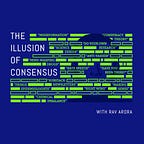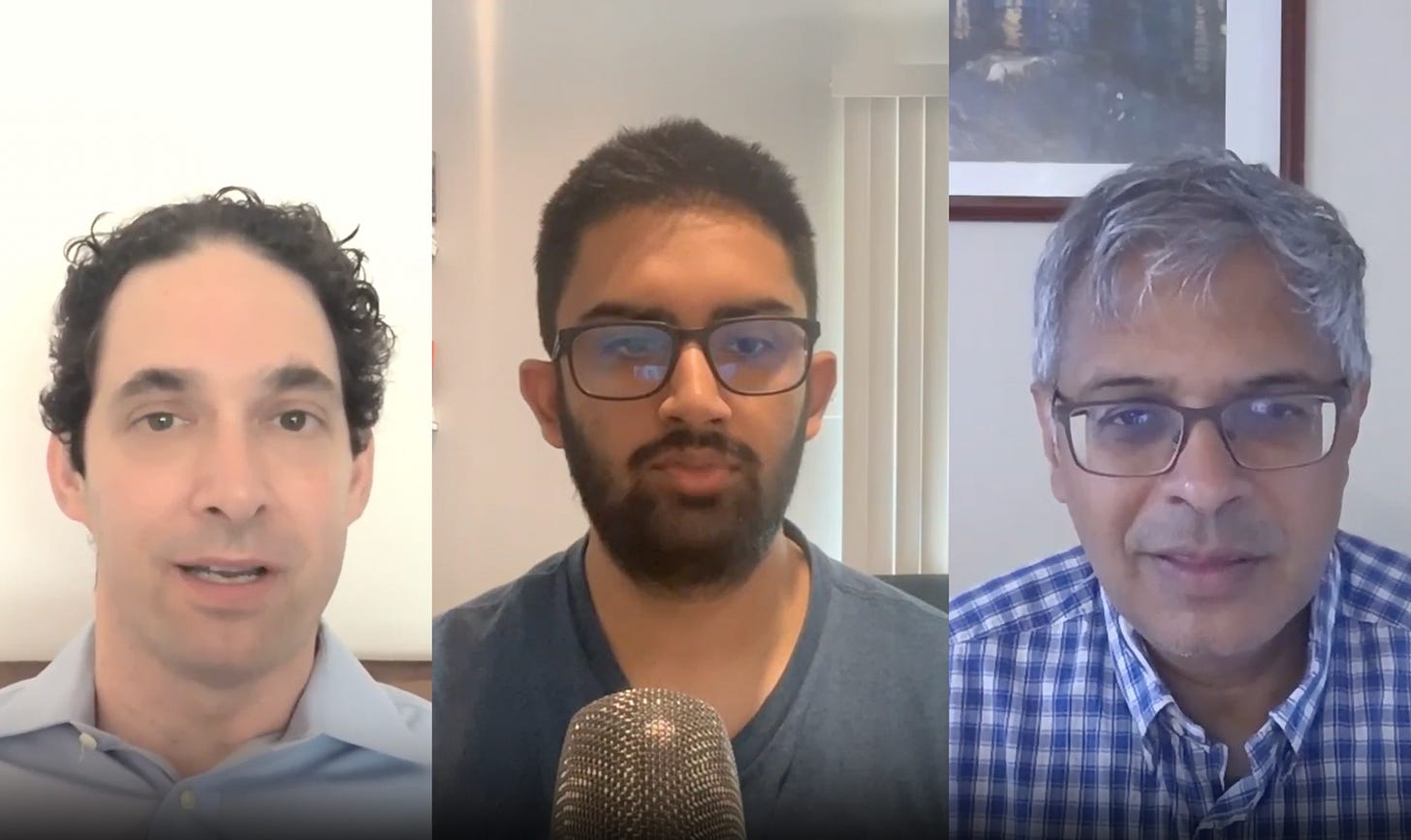Hi everyone,
In today’s special edition podcast, Alex Berenson joins Dr. Jay and Rav to discuss his New York Times career, writing spy novels, how the Homeland T.V series stole from his work, reporting on the risks associated with cannabis, his transition to the pandemic’s most smeared man, and being censored for his (vindicated) views.
This special trio recorded this two-hour podcast two days ago and due to the topical nature (Missouri v. Biden) they decided to release it right away!
We hope you enjoy it and consider supporting us by becoming a paid subscriber to receive access to member-only Q+As, monthly Zoom calls, and exclusive investigative journalism. For a limited time, we are offering new readers a 20%-off lifetime yearly subscription or 50%-off founding member option:
Your support goes a long way in helping fuel future major projects. Stay tuned for upcoming guests such as Mattias Desmet, Dr. Robert Malone, Dr. Joseph Ladapo, Lee Fang, and more.
— The Illusion of Consensus Team
(Spotify link) (Apple podcasts)
Full video podcast (with the lovely Mrs. Berenson dropping by to say hello!):
Full Video: Alex Berenson Joins Dr. Jay and Rav For a Two Hour Podcast
Watch now (127 min) | The full video podcast is available to all paid subscribers. Please enjoy!
Highlighted Transcript:
Alex on learning that fear is the most powerful emotion in the pandemic:
The single most striking email I've gotten, and I'll never forget, is somebody said, “I thought hate and love were the two most powerful emotions, but I was wrong. It's fear.”
And that's true.
When you scare people, you can get them to do anything. Look, I wanted to have a discussion about whether the school should be open. I wanted to have a discussion about whether lockdowns made any sense and what the IFR really was. And I did have those discussions. I did present those facts, but I decided fairly early on that it was also important to be a voice for all the people who wanted to say this.
I'm not gonna be afraid and I'm not gonna let you lock me in my house. This is the United States. I have the right to go outside.
Alex (respectfully!) disagrees with Dr. Jay on the severe disease prevention of vaccines:
I think we may still disagree about this a little bit, but I don't think there's much protection from death after the protection from infection fades. I think that the healthy vaccine effect is so powerful that you cannot tell. In other words, Rav, vaccines are preferentially given, even the COVID vaccine, to people who are healthier than not.
There's this tiny group of people near the end of their lives who are not vaccinated under any circumstance. They're in hospice, they have late stage cancer, and that group of people accounts. for a huge amount, both of all-cause mortality and COVID mortality. And those people get lumped as unvaccinated because they are unvaccinated. You see this with the flu vaccine and I can point you to very good epidemiological data on the COVID vaccine that suggests the problem is at least as bad or worse.
Alex shares how the TV series Homeland stole from his novel The Faithful Spy:
If you watch Homeland, you'll see there's a character named Saul Berenson - and that is not a coincidence. You'll also see that the arc, if you read the Faithful Spy, mirrors the architecture of Homeland. The central architecture of the three main characters is exactly the same as the central architecture of the baseball club.
The creators stole many specific details about what I had written. And they credited me not by buying the rights to the Faithful Spy, but by naming the Mandy Patinkin character, Saul Berenson.
Even though I'm not a naive person, I was somewhat seduced by Hollywood. They had told me that they had gotten all this from this Israeli television show, which was also called Homeland. And in reality, once I actually saw that show, I realized it wasn't true. Nonetheless, it was too late for me to do anything about it.
The reason I mention all of this is, had this not happened or had it happened in a somewhat different way — had they actually bought the rights and had I become a writer on the show with them — my career might've gone in a different direction. I wouldn't have maybe been in the position I was in 2018 where I would have started getting back into non-fiction books.
But it’s all water under the bridge.
I'm very happy with the Wells series, which was 12 books. I still get emails from people asking me, is there gonna be a 13th book? Because the last one came out in 2018. And maybe there will, but I haven't even had time to think about it.
Alex on the importance of reporters having humility:
One of the things about being an outside reporter is that you have to recognize you are not perfect either. One of the things you always have to be careful about as one of these people is that you don't turn yourself into the hero of the story. Because you are just as flawed as all the people you're writing about. And I've seen that happen with other reporters….turning into crusaders. That is a really dangerous path to take. One of the good things about Twitter is that people are constantly telling you how awful you are. I think it does provide a corrective to anybody who's paying attention.
Rav on an alternate reality where Alex Berenson is respected rather than demonized:
During operation warp speed, the pressure was coming from the Trump administration to develop the vaccine as quickly as possible. And then you had people like Dr. Eric Topol and Dr. Peter Hotez who were sounding the alarm saying, this vaccine is being rushed far too quickly. That was kind of the narrative. And obviously, Joe Biden, Kamala Harris, were saying they’re not taking the Trump vaccine - all that lunacy. And then the narrative very quickly shifted.
I mean, I wonder for you Alex, if Trump won the election, maybe you would have had a spot. Maybe you would have been the pandemic's most vindicated man at the Atlantic, not the pandemic's wrongest man, potentially, depending on the political climate.
Alex discusses how the pro-vaccine hysteria harmed his personal life in more than one way:
I was forced off the board of City Harvest, which was a food rescue charity in New York that I'd been a member of for basically my whole life. I mean, really, since I was a teenager, I was their longest donor and I'd been on the board for 10 years. I lost many friends. I'd say more than half the people I was friends with at the beginning of this were not talking to me. Most of those people have not come back.
It was a public shaming. It was intentional. It was designed to show people this is what happens if you speak out against the vaccines. It would have been wrong even if I'd been wrong about all of it. The fact that I have been sort of proven right about it, again, makes it far worst.














